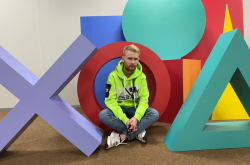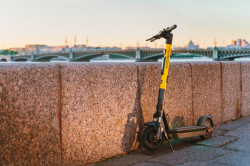Learning to live anew
When I was growing up in Vladivostok, my family never treated me like a kid. I spent most of my time not with my peers, but with adults who treated me like an equal. My mom helped me with my homework. My aunt showed me around a bakery plant and explained how it all worked. When I was in my early teens, I learned basic automotive engineering from my older brother, carpentry – from my father, welding – from my grandfather, and baking – from my grandmother. So I was a true jack of all trades then.
As a child, I dreamed of becoming a pilot. My mother and mother were architects, my older brother – an engineer. How did I end up in IT? When I was 14, I loved playing strategy games and was a big fan of Minecraft. It made me interested in the way online servers work. At the same age, I had an accident: on a walk with my friend, I found a gas cylinder that exploded in my hands. I lost my right hand and injured my left; my vision and hearing were also damaged.
When I woke up in the ICU and became aware of my condition, I realized that my dream of becoming a pilot would forever remain only a dream. It was then that I decided I should master computers and make them work for me – not the other way around. At the time, I didn’t know about screen readers – apps or devices that describe everything there is on the screen to visually impaired users – but I knew that something like this had to exist and that was the field I needed to work in. So, when people ask me how I got into IT, I say I slept my way there – I just don’t mention that I slept on the hospital bed.
After six months of surgeries, I spent a year in recovery and managed to regain control of my left hand, as well as light sensitivity in my eyes. As a school student, I learned to handle daily tasks at a special rehabilitation center for the visually impaired. After that, I went to a special school for people in my condition, where apart from the typical school curriculum, I learned to take care of myself. There, I also learned to use the computer with a screen reader; I grew interested in automation. I was fascinated with the first app I wrote, which sent files from one place to another on its own, and the first website I created. I didn’t really understand how it all works, but I was learning everything I could about it.
I didn’t like math, so I didn’t apply to any Bachelor’s programs that focused on it – but I wanted to become a programmer. ITMO was my first choice, but back then I didn’t think I could handle moving to a new city, so I decided to settle on Far-Eastern Federal University (FEFU). I applied for a program in software engineering because I thought that’s where I would learn to code and manage IT projects. Among all applicants, I had the third highest score – I was so happy to get in! But I didn’t know what I was getting myself into: in our first class, we were welcomed to the Faculty of Physics and Mathematics – so the math I was running away from had finally caught up with me.
Read also:
ITMO Admissions 2023: Programs, Deadlines, and How To Apply
Russia’s First Master’s in Programming for the Visually Impaired Launches at ITMO
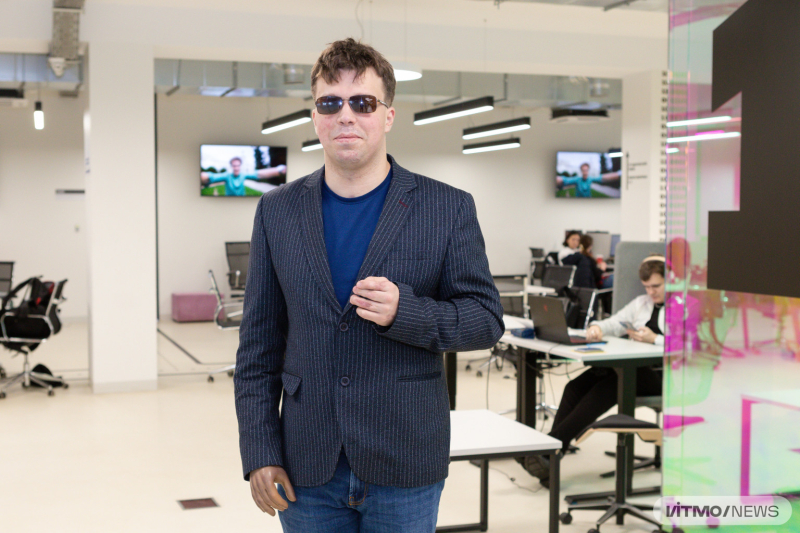
Evgeny Nekrasov. Photo by Dmitry Grigoryev / ITMO.NEWS
Higher education for the visually impaired in Russia and abroad
A lecturer at FEFU told me that a university education is not just a degree. This was true for me. At FEFU, I got to take part in numerous IT events. For instance, I went to Google DevFests in Vladivostok, Khabarovsk, Moscow, Nizhny Novgorod, Kazan, and St. Petersburg; I visited a special meetup at Skolkovo, took part in hackathons all over the country, and participated in the WorldSkills championship. My whole 2018-2019 academic year was spent in travels. So, apart from fundamental education, the university helped me get to know lots of different people and partake in various events.
During my studies, I started working in IT (I have over eight years of work experience now) and learned over ten programming languages for specific purposes. I use an adapted keyboard for the left hand in my work and studies, as well as a screen reader app that reads out whatever is happening on the screen, or whatever I type. For anyone who hasn’t used such a program, its messages would sound like gibberish: I listen at the speed of 1,000 words per minute (the typical reading speed is 200-250 words per minute – Ed.). I also ask my friends to describe images to me when I need it. Otherwise, my study process isn’t different from anyone else’s.
In my third year, I spent a semester abroad at the University of Salzburg in Austria, but this was a disappointing experience. When I came to the university’s center for the impaired, the staff there didn’t understand how I was learning the way I did. They were shocked that I didn’t require a quiet room or Braille and that I studied IT subjects and not the humanities, like many people with my condition. I was the university’s first visually impaired student with one hand.
Here’s another example: while I was there, I signed up for a course in machine learning and AI for second-year Master’s students. In class, the lecturer explained the basics of algorithms. After class, I came up to him to show my project – a neural network that could identify images in ID documents. The lecturer was ready to give me the final grade for the course then and there, but he was very surprised when he saw that I was a Bachelor’s student. All in all, I didn’t gain much from my exchange semester.
Read also:
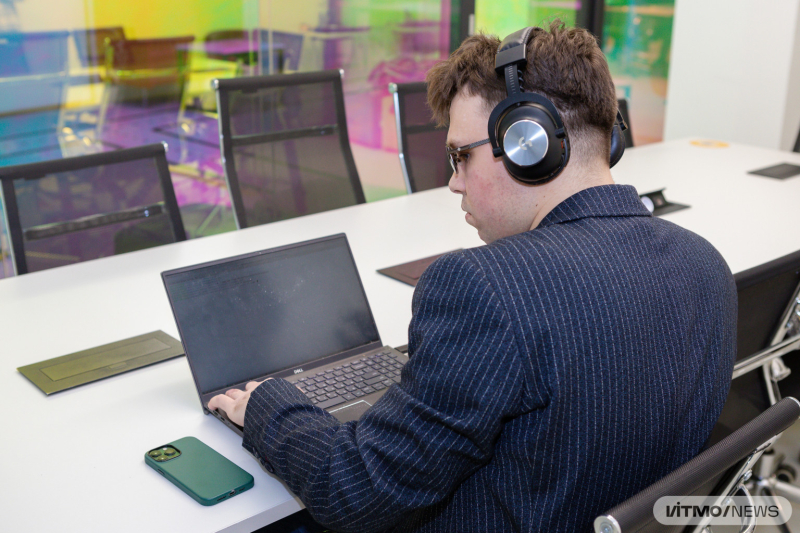
Evgeny Nekrasov. Photo by Dmitry Grigoryev / ITMO.NEWS
Making convenient homes for the visually impaired
After I graduated with my Bachelor’s degree, I enrolled in the program Internet of Things Technologies at ITMO. For me, getting a Master’s degree meant being able to earn a higher salary, as well as meet new people and gain enough knowledge to apply for a PhD program. At first, the lecturers here didn’t know how to work with me. But when they learned that I could not only complete all the same assignments but also had over eight years of experience, a position as a DevOps engineer at VK, and expertise in several fields – from AI to web interfaces for the visually impaired – they treated me like any other student.
I am also developing a startup that I defended with flying colors as a thesis this year. My team and I want to make automated smart homes for people with disabilities. It’s true that these days we can accomplish quite a lot with voice assistants, but they are not really useful for people with disorders of fine motor skills, hearing, and vision: deaf people aren’t comfortable with these devices, while people with fine motor skill or vision disorders need adaptive interfaces.
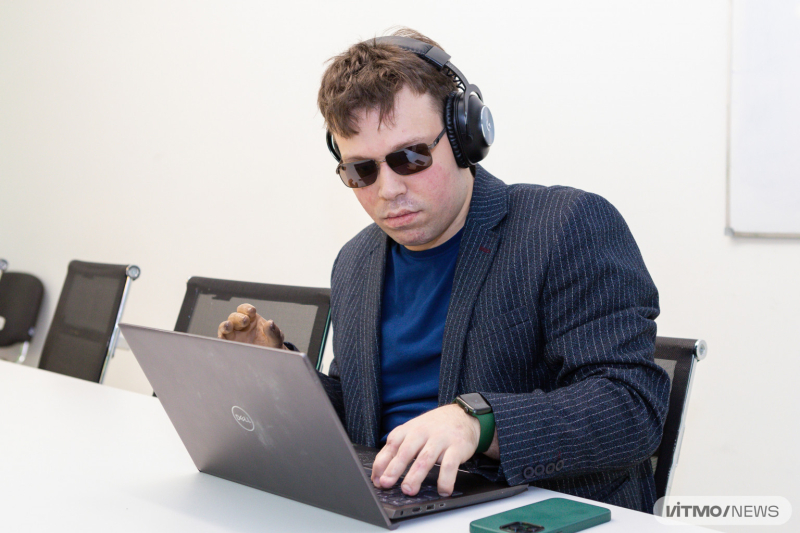
Evgeny Nekrasov. Photo by Dmitry Grigoryev / ITMO.NEWS
My team and I are working on a universal solution: the IRlive armband with a human-machine interface. With this device, users will be able to interact with smartphones, VR, video games, smart home environments, and robotic systems, including prosthetics or manipulators. Our armband registers hand movements and electromyography – the bioelectric potentials in moving muscles. So, when a user moves their hand, the device reads the bioelectric potential and the associated movement to send the corresponding request to a smart home. Currently, the system can detect the user’s location, help monitor their health, and control smart sockets, lamps, and locks, as well as regulate the temperature and close doors. We already have an MVP and a prototype – now, we’re looking for our first clients.



